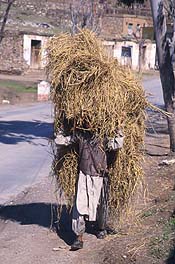|
Rural people face
many transport problems
Production, trade and daily life require
the movement of goods and people. Most women and men in rural areas
have few transport alternatives to walking and carrying loads on
their heads or backs.
Rural people, particularly women, often walk long distances each
day carrying heavy loads, such as water, firewood, grains, agricultural
produce and goods for marketing. Large-scale investment in transport
infrastructure has had little impact on family and village-level
transportation problems.
Many studies have shown how much time and effort are invested in
basic transport, particularly by women. In sub-Saharan Africa, it
has been estimated that women account for 70% of the time spent
on transport and nearly 85% of the effort. For example:
- In Chipinge, Zimbabwe, women's annual
water collection was equivalent to a 2260 kilometre walk with
a load of 20 kilograms.
- In Makete, Tanzania, women spent
over four hours per day on transport tasks.
- In Beira, Mozambique, women
spent 3.6 hours per day transporting water and firewood.
|
 Man carrying forage in Pakistan
Man carrying forage in Pakistan |

